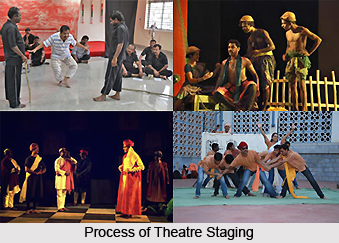Samudaya Theatre Company took birth from the mind of R.P Prasanna, a graduate from National School of Drama. He returned to his hometown Bangalore in 1975 with an aim to form something beyond the Indian People`s Theatre Association. Thus, the creation process of the `Samudaya` theatre company started. Initially, he assigned few talented young people and named it `Samudaya Theatre Company`.
In that period, one could not think of organizing high quality English plays. But R.P Prasanna was inclined to bring in Shakespeare and Brecht in the theatres for the urban middle class people. He was in need of a group who would bring out a good performance. He wanted the people from the grass root level to relate to it and to get involved to it. So, he first convinced few actors from Bangalore and then moved to the other interested groups of youths from Mysore and Mangalore.
Prasanna and his actors needed to be careful for this was, after all, the height of Indira Gandhi`s Martial Law rule. On June 12, 1975, the High Court of Allahabad had proclaimed that Indira Gandhi had used unfair means to win the state elections of Uttar Pradesh last year. She was asked to vacate her seat in Parliament and resign as Prime Minister. She refused and appealed to the Supreme Court, which overruled the judgment after 13 days. Emergency was declared next day and later was lifted to declare parliamentary election in 1978. Indira Gandhi fought from Chikmagalur where she faced with fierce opposition from various unknown sources.
 Samudaya Theatre Company supported progressive artists from Karnataka to design a campaign to challenge Indira Gandhi`s election plan. As the emergency started, Prasanna convinced somehow five theatres of liberation groups. He encouraged these groups to develop a street show of skits mixed with political songs in 1978. R.P Prasanna asked for the support of the political opposition parties and he got it too. He also organized a month-long mobile theatre of liberation festival in Chikmagalur district. The five Samudaya Theatre Company units traveled from village to village by bicycle. Wherever they went, they were provided foods and shelter by the political organisers of the opposition, who also take care of publicity. These performers also needed to sell postcards and books to finance their next tour. Even the market places would often turn into a spontaneous venue for the political discussions. During the `Jatha`, the different Samudaya units performed several hundreds of times. Whereas a stationary could perform only two now plays per year. Thus the impact of the performances increased while performing in `Jatha`.
Samudaya Theatre Company supported progressive artists from Karnataka to design a campaign to challenge Indira Gandhi`s election plan. As the emergency started, Prasanna convinced somehow five theatres of liberation groups. He encouraged these groups to develop a street show of skits mixed with political songs in 1978. R.P Prasanna asked for the support of the political opposition parties and he got it too. He also organized a month-long mobile theatre of liberation festival in Chikmagalur district. The five Samudaya Theatre Company units traveled from village to village by bicycle. Wherever they went, they were provided foods and shelter by the political organisers of the opposition, who also take care of publicity. These performers also needed to sell postcards and books to finance their next tour. Even the market places would often turn into a spontaneous venue for the political discussions. During the `Jatha`, the different Samudaya units performed several hundreds of times. Whereas a stationary could perform only two now plays per year. Thus the impact of the performances increased while performing in `Jatha`.
The Samudaya Theatre Company Theatre group came back to Chilmagalur for one-day manifestation at the end of the month. By this time, Indira Gandhi already lost the election and for the first time since independence, the rule of the Nehru-Gandhi dynasty was broken. The Janata Party came to the power. But they would hardly give the credit for the win to the Samudaya Theatre Company and just said that the creative campaign made a contribution.
As R.P Prasanna`s group succeeded to make an impact, 32 new Samudaya units were founded all over the state. These groups maintained their communication by means of a monthly magazine, meetings and workshops. Meanwhile, the Samudaya core group in Bangalore continued its activities towards the well being of the middle class.
Now, Samudaya Theatre Company organized another massive `Jatha` in 1980. This time their target was bigger and planned to cover nineteen districts in Karnataka. But as per R.P Prasanna`s view, many of the participating groups got confused with their political views after the defeat of Indira Gandhi. He himself got disillusioned after six years and left for Delhi to join film and television. So, leaving the full time cultural activism through Samudaya theatre group, he became a visiting professor at the National School of Drama. Thus the network of Samudaya Theatre Company Theatre Group weakened and broke up.




















